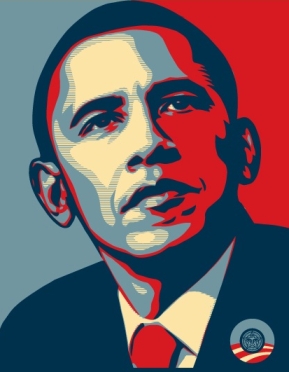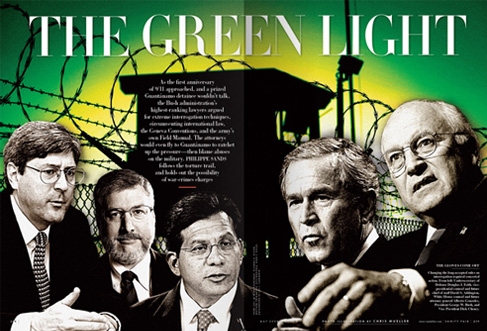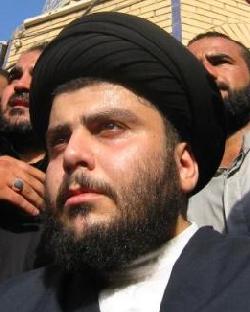Iraq: Sadr party faces rising isolation
Iraq’s major Shiite, Sunni and Kurdish parties have closed ranks to force anti-American cleric Muqtada al-Sadr to disband his Mahdi Army militia or leave politics, lawmakers and officials involved in the effort said Sunday.
Such a bold move risks a violent backlash by al-Sadr’s Shiite militia. But if it succeeds it could cause a major realignment of Iraq’s political landscape.
The first step will be adding language to a draft election bill banning parties that operate militias from fielding candidates in provincial balloting this fall, the officials and lawmakers said. The government intends to send the draft to parliament within days and hopes to win approval within weeks.
U.S. and Iraqis battle militias to end attacks
Sharp fighting broke out in the Sadr City district of Baghdad on Sunday as American and Iraqi troops sought to control neighborhoods used by Shiite militias to fire rockets and mortars into the nearby Green Zone.
But the operation failed to stop the attacks on the heavily fortified zone, headquarters for Iraq’s central government and the American Embassy here. By day’s end, at least two American soldiers had been killed and 17 wounded in the zone, one of the worst daily tolls for the American military in the most heavily protected part of Baghdad. Altogether, at least three American soldiers were killed and 31 wounded in attacks in Baghdad on Sunday, and at least 20 Iraqis were killed, mostly in Sadr City.
The heightened violence came on the eve of Congressional testimony in Washington by Gen. David H. Petraeus, the senior American commander in Iraq, and Ryan C. Crocker, the American ambassador here, to defend their strategy for political reconciliation and improved security in the country.
Permissible assaults cited in graphic detail
Thirty pages into a memorandum discussing the legal boundaries of military interrogations in 2003, senior Justice Department lawyer John C. Yoo tackled a question not often asked by American policymakers: Could the president, if he desired, have a prisoner’s eyes poked out?
Or, for that matter, could he have “scalding water, corrosive acid or caustic substance” thrown on a prisoner? How about slitting an ear, nose or lip, or disabling a tongue or limb? What about biting?
These assaults are all mentioned in a U.S. law prohibiting maiming, which Yoo parsed as he clarified the legal outer limits of what could be done to terrorism suspects as detained by U.S. authorities. The specific prohibitions, he said, depended on the circumstances or which “body part the statute specifies.”
Iraq report details political hurdles and future options
A new assessment of U.S. policy in Iraq by the same experts who advised the original Iraq Study Group concludes that political progress is “so slow, halting and superficial” and political fragmentation “so pronounced” that the United States is no closer to being able to leave Iraq than it was a year ago.
This Story
The experts were reassembled by the U.S. Institute of Peace, which convened the congressionally mandated Iraq Study Group, a high-level panel that assessed U.S. policy in Iraq and offered recommendations in 2006. The new report predicts that lasting political development could take five to 10 years of “full, unconditional commitment” to Iraq, but also cautions that future progress may not be worth the “massive” human and financial costs to the United States.
Democrats should treat Petraeus and his surge as irrelevant
It was supposed to be a “cakewalk.” General Petraeus would come to Congress, armed with his favorite charts showing that the “surge” had dramatically reduced violence in Iraq. He would earn universal acclaim for his plan to “pause” troop reductions from July until after the election in November — the same plan that John McCain counts on to help him win that election.
When it comes to Iraq, though, the Bush administration’s cakewalks never seem to turn out as planned. The renewed violence of these last weeks in Iraq, and the prospect of more to come, gives war critics ample ammunition for a counterattack. The Democrats, including Senators Hillary Clinton and Barack Obama, may find it irresistible to assault the general, and the President, with every argument they can muster in the hearings this week. However, a recent report suggests they may resist that impulse and treat the impact of the surge as an irrelevant issue.
Let’s hope that report is right, because a debate focused on military success or failure is a trap, with Petraeus’s testimony as the bait. After all, no debate in Congress will really be about the level of violence in Iraq. “Has the surge worked?” is just a symbolic way of asking: “Would you rather believe that America is a winner or a loser?” And in any battle over patriotic symbolism, the Republicans always seem to have the bigger guns.
Army is worried by rising stress of return tours to Iraq
Army leaders are expressing increased alarm about the mental health of soldiers who would be sent back to the front again and again under plans that call for troop numbers to be sustained at high levels in Iraq for this year and beyond.
Among combat troops sent to Iraq for the third or fourth time, more than one in four show signs of anxiety, depression or acute stress, according to an official Army survey of soldiers’ mental health.
The stress of long and multiple deployments to Iraq is just one of the concerns being voiced by senior military officers in Washington as Gen. David H. Petraeus, the senior Iraq commander, prepares to tell Congress this week that he is not ready to endorse any drawdowns beyond those already scheduled through July.
Why the testimony of General Petraeus will be delusional
Since the Soviet Union vanished in 1991, only one nation has made itself at home everywhere on Earth; only one nation has felt that the planet’s interests and its own interests were essentially one; only one nation’s military garrisons and patrols our world from Greenland to the tropics, from the sea bed to the edge of space; only one nation’s military talks about its vast array of bases as its “footprint” on the planet; only one nation judges its essential and exceptional goodness, in motivation if nothing else, as justification for any act it may take.
Israel, U.S. plan to release details on Syria attack
Israel and the United States are coordinating the release of details on the air force strike in Syria last September, which foreign reports claim targeted a nuclear installation Syria was constructing with North Korean assistance. American officials may reveal details of the strike later this month during congressional hearings.
Even though the defense establishment in Israel is opposed to any publication of details of the attack, the Prime Minister’s Bureau and U.S. President George W. Bush’s administration are of the opinion that it is now possible to reveal details because there is little chance of a conflagration as a result of a Syrian decision to avenge the attack.

 n the 40th anniversary of Martin Luther King Jr.’s death, few truths ring louder than this: Barack Obama and Jeremiah A. Wright Jr. express in part the fallen leader’s split mind on race, a division marked by chronology and color.
n the 40th anniversary of Martin Luther King Jr.’s death, few truths ring louder than this: Barack Obama and Jeremiah A. Wright Jr. express in part the fallen leader’s split mind on race, a division marked by chronology and color. here were signs that Obama’s hard work and extensive television advertising were paying off: various polls showed the race tightening a bit. The talk-show muttering had migrated from Jeremiah Wright to Clinton’s Bosnian sniper-fire fantasy. Hordes of new voters were registering in Pennsylvania. It was not impossible that Obama would turn Clinton’s predicted victory into a closer-than-expected moral defeat.
here were signs that Obama’s hard work and extensive television advertising were paying off: various polls showed the race tightening a bit. The talk-show muttering had migrated from Jeremiah Wright to Clinton’s Bosnian sniper-fire fantasy. Hordes of new voters were registering in Pennsylvania. It was not impossible that Obama would turn Clinton’s predicted victory into a closer-than-expected moral defeat.
 he Iraqi military’s offensive in Basra was supposed to demonstrate the power of the central government in Baghdad. Instead it has proven the continuing relevance of anti-American cleric Moqtada al-Sadr. Sadr’s militia, the Mahdi Army, stood its ground in several days of heavy fighting with Iraqi soldiers backed up by American and British air power. But perhaps more important than the manner in which the militia fought is the manner in which it stopped fighting. On Sunday Sadr issued a call for members of the Mahdi Army to stop appearing in the streets with their weapons and to cease attacks on government installations. Within a day, the fighting had mostly ceased. It was an ominous answer to a question posed for months by U.S. military observers: Is Sadr still the leader of a unified movement and military force? The answer appears to be yes.
he Iraqi military’s offensive in Basra was supposed to demonstrate the power of the central government in Baghdad. Instead it has proven the continuing relevance of anti-American cleric Moqtada al-Sadr. Sadr’s militia, the Mahdi Army, stood its ground in several days of heavy fighting with Iraqi soldiers backed up by American and British air power. But perhaps more important than the manner in which the militia fought is the manner in which it stopped fighting. On Sunday Sadr issued a call for members of the Mahdi Army to stop appearing in the streets with their weapons and to cease attacks on government installations. Within a day, the fighting had mostly ceased. It was an ominous answer to a question posed for months by U.S. military observers: Is Sadr still the leader of a unified movement and military force? The answer appears to be yes.